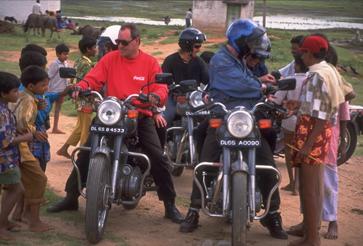 Day
01. Early morning arrive Madras and transfer to your
hotel. Afternoon get to know your motorcycle. Day
01. Early morning arrive Madras and transfer to your
hotel. Afternoon get to know your motorcycle.
Madras is India's fourth largest city and the capital of Tamil Nadu state. It suffers far
less from congestion and overcrowding than other big cities in India. .
Day 02. Madras - Pondichery.
PONDICHERY. Formerly a French colony settled in the 18th century, Pondicherry became
part of the Indian Union in the early '50s when the French voluntarily relinquished
control. Together with the other former French enclaves of Karaikal (also in Tamil Nadu),
Mahe (Kerala) and Yanam (Andhra Pradesh), it now forms the Union Territory of Pondicherry.
Day
03. Pondichery - Thanjavur.
THANJAVUR. Thanjavur rose to glory during the later Chola period between the 10th
and 14th centuries AD and became the centre of learning and culture. Overrun by green
fertile plains, Thanjavur, the headquarters of the district of the same name, is known as
the rice bowl of Tamil Nadu. The temple wonders of south India. The district is also known
for its exquisite handicrafts, bronze statue casting, pit6h temple models and south Indian
musical instruments like the Veena and Mridangam.
Day 04. Thanjavur - Madurai.
MADURAI. Madurai is a bustling city of a million people, packed with pilgrims,
business people, bullock carts rickshaw-wallahs. It is one of southern India's oldest
cities, and has been a centre of learning and pilgrimage for centuries. Madurai's main
attraction is the famous Shree Meenakshi Temple in the heart of the old town, a riotously
baroque example of Dravidian architecture with gopurams covered from top to bottom in a
breathless profusion of multicolored images of gods, goddesses, animals and mythical
figures. Nothing quite like it exists outside Disneyland. The temple seethes with activity
from dawn till dusk, its many shrines attracting from all over the world. It's been
estimated that there are 10,000 visitors here on any one day!
Day
05. Visit of Madurai.
Sightseeing: Bazar, Shree Meenakshi Temple, Tirumalai Nayak Palace.
Day 06. Madurai - Kanyakumari.
KANYAKUMARI. Kanyakumari is the Land's End of India. Here, the Bay of Bengal meets
the Indian Ocean and, at full moon, it's possible to enjoy the unique experience of seeing
the sunset and the moon rise over the ocean simultaneously. Kanyakumari is also a popular
pilgrimage destination of great spiritual significance to Hindus. It is dedicated to the
goddess Kanyakumari, Youth Virgin, who is an incarnation of Devi, Shiva's wife.
Day 07. Kanyakumari - Kovalam.
KOVALAM. Just south of Thiruvananthapuram, is one of India's best beaches and the
favourite watering hole of travellers in southern India. The main beach consists of a two
fairly small, palm-fringed coves which are separated from the beaches on either side by
rocky headlands. There is good surf on most day but, if you're not a strong swimmer, you
should approach the water cautiously until you're familiar with the rip.
Day 08. Kovalam - Cochin.
COCHIN. With its wealth of historical associations and its beautiful setting on a
cluster of islands and narrow peninsulas, the interesting city of Kochi reflects the
eclecticism of Kerala perfectly. Here, you can see the oldest church in India, winding
streets crammed with 500 year old Portuguese houses, cantilevered Chinese fishing nets, a
Jewish community whose roots go back to the Diaspora, a 16th century synagogue, a palace
built by the Portuguese and given to the Raja of Cochin. It contains some of India's most
beautiful murals and several places where you can see a performance of the world-famous
Kathakali dance drams.
Day 09. Cochin - Palakkad.
Palakkad. Surrounded by paddy fields. Historically, thanks to the natural 20-km
wide Palakkad gap in the western ghats, this area has been one of the chief entry points
into Kerala. The fort built by haider Ali of Mysore is worth a visit.
Day 10. Palakkad - Ooty.
OOTY. This famous hill station near the tri-junction of Tamil Nadu, Kerala and
Karnataka is 2268 m above sea level in the Nilgiri mountains. It was founded by the
British in the early part of the 19 century to serve as the summer headquarters of the
government of Madras. Before that time, the area was inhabited by the Todas. These tribal
people still live there, but today, only 3000 remain. The Todas were polygamists and
worshipped buffalos, and you can see their animist shrines in various places.
Day 11. Ooty - Mysore.
MYSORE. Sandalwood City! Everywhere you go in this beautiful city you'll find
yourself surrounded by the lingering aromas of sandalwood, jasmine, rose, musk, frangipani
and many others. It's one of the major centres of incense manufacture in India, and scores
of small, family-owned agarbathi factories are scattered all over town, their products
exported all over the world.
There are plenty of other reasons why you would not want to miss Mysore. Until
independence the city was the seat of the maharajas of Mysore, a princely state covering
about a third of present day Karnataka..
Day 12. Mysore - Bangalore.
BANGALORE : Located 1000 m above sea level, this bustling capital city of Karnataka
has a perpetual holiday atmosphere, thanks mainly to its picnic weather. Founded in 1537
by a local chieftain Kempe Gowda, Bangalore has seen much and imbibed even more. Rapid
industrial growth has not taken away Bangalore's old-world charms.
Day 13. Bangalore - Madras.
Day 14. Madras. Rest and shopping. Transfer to airport. |